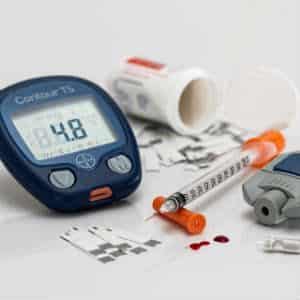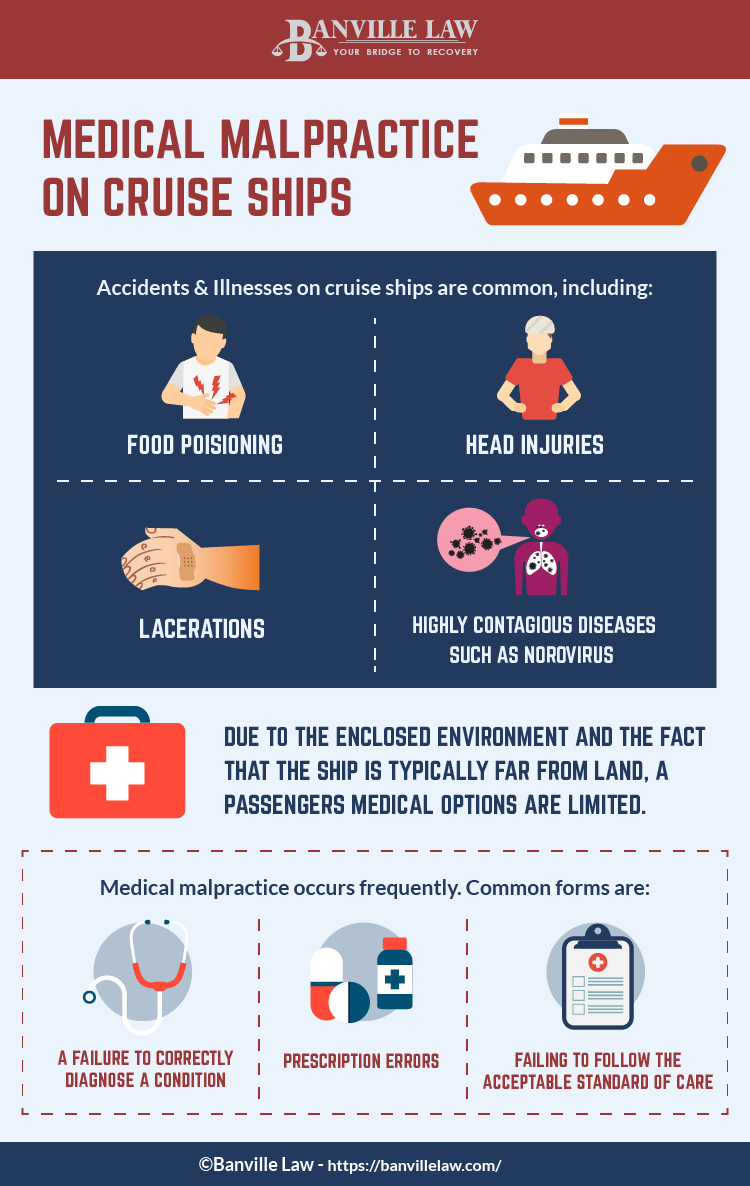Even though vacations are supposed to be fun, many will admit that the process of packing and traveling is very stressful. This stress, the exposure to thousands of other people with their own set of germs, and the fact that cruise ships are an enclosed environment once they set sail all work on the body’s immune system, causing many passengers to become ill.
Cruise ships always have medical staff on board, who are supposed to be equipped to treat all medical illnesses and injuries that may pop up. Yet frequently, passengers find that the care offered to them is substandard at best.
When a doctor treats a patient, they owe it to that patient to provide them with the medical standards of care. This means that taking into consideration the patient’s age, weight, and medical conditions, the doctor’s duty is to provide them with the form of care that a skilled health care professional in the medical community would be expected to provide.
For example, if a patient comes into a doctor’s office complaining of a sore throat, it would be normal for a doctor to look into the back of the throat, take swabs, and then, depending on what they find perhaps prescribe an antibiotic or recommend further testing. If, however, the doctor decides to not even look in the throat and then recommends a medication for the stomach, this is likely not providing the proper standard of care.
If the patient sustains harm because a doctor failed in their duty, the patient may then find that they are not only physical suffering but also financially as well. Or, if the worst happens, a life may end far too soon.
For more information from our cruise ship accident lawyers, visit our dedicated page.

One of the most recent victims was an elderly man who had gone on a Royal Caribbean cruise to Bermuda. While the ship was in port, he fell and hit his head.
His wife insisted that he seek medical attention so he went to the ship’s medical center where he was seen by one of the nurses on call. She noted that he did have a large lump, bruising, and an abrasion. She did not have a doctor examine him or perform any testing and simply told his wife to keep an eye on him and watch for signs of a concussion.
It wasn’t long after he returned to his room that his family noted that he wasn’t behaving normally. His daughter called the ship’s personnel and requested assistance but it took them nearly 20 minutes to get a wheelchair and help him back to the medical center. Instead of seeing the patient immediately, the medical staff insisted on obtaining his credit card information first. Only then, four hours after his accident, was he examined by a doctor.
The doctor determined that he need further medical testing and treatment and that his condition was serious enough that he had to be flown from the island to a hospital in New York. It was there that he was finally diagnosed with a brain bleed. Due to the lengthy wait, serious damage to his brain had already been done and he fell into a coma. He never again regained consciousness and died nearly a week later.
His family believes that if he had been seen by a doctor immediately and if the crew had been more responsive, that he would have lived.
Although it would be unreasonable for anyone to believe that a cruise ship can house the same diagnostic tools, medications, and surgical tools that an New York hospital would have, however, it is reasonable to believe that the medical staff on board would do their best with what they have available, treat patients in a timely manner, and recognize when the patient’s condition is serious enough that they need to be transported to a facility that can provide them with that care.
Yet time and time again, the medical staff on cruise ships make prescription errors, misdiagnose a patient’s condition, and fail to take into consideration the patient’s other medical conditions before treating them for a new one.
The patients are the ones who suffer the consequences and frequently a medical condition that could have been quickly and easily treated develops into a much more serious condition that could cause permanent damage. Or, as in the previous case, the patient may die.
The extra care that is typically needed in these situations can be very expensive. Frequently, the only way to the victims of medical malpractice to recoup those losses and obtain the care that they need is to file a lawsuit.
Filing a lawsuit is never a simple process and medical malpractice lawsuits involving a cruise ship are particularly complex. Hiring an experienced attorney who can help is always the best option.
An attorney will help by handling all of the necessary paperwork, speaking with insurance companies, collecting witness statements, and fighting tirelessly for their client’s rights. Although it may take months, the potential gains are worth it. Compensation for medical expenses, lost wages from time away from work, physical pain, and suffering, and even emotional trauma may be available.
Continue reading cruise ship accident pages:
